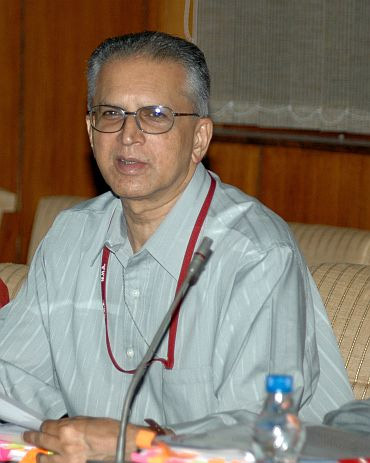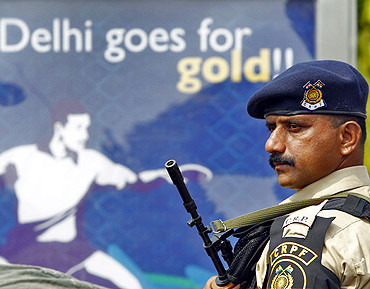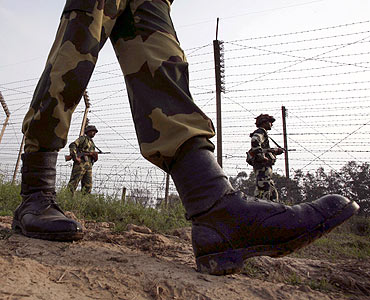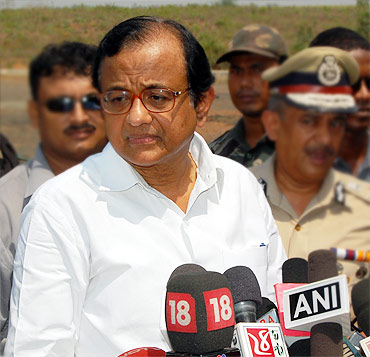
Sheela Bhatt in New Delhi
Union Home Secretary Gopal Krishna Pillai is retiring on June 30 after 39 years in service. Bureaucrats in India are made of hard stuff but Pillai injected some soft power to the job by making the home ministry accessible to the media, by responding on his cell phone all the time, by giving quotes to television cameras parked outside his office and by implementing policy to the satisfaction of his boss, Home Minister P Chidambaram.
Pillai and his wife Sudha, also an IAS officer now retired and re-inducted into the Planning Commission, were dubbed as the "power couple". What worked for Pillai was his level of confidence in what he was doing. His father and grand-father were also civil servants.
Pillai knew how to approach files and dispense it with efficiency. He was quite clever, like many Indian bureaucrats, in not treading on political landmines. He earned kudos when he was joint secretary in charge of the north-east (1996-2000). He showed sensitivity in his approach and tried to bring the north-east closer to New Delhi.
As commerce secretary his stint got a mixed response. His penchant to fast-track approval for SEZs made many farmers, NGOs and activists unhappy. As commerce secretary his total commitment to the government policy on privatisation and liberalisation in the ministry made him unpopular amongst poor farmers and NGOs fighting for land rights.
However, no one can doubt that the man knew his job and also its potential early in life.
As district collector of Quilon, Kerala (1982-85) he showed his mettle. He helped Kerala's cashew, coir and handlooms industries in a big way.
As his distinguished career comes to an end, in a conversation with rediff.com's Sheela Bhatt, he shared a few thoughts on the socio-economical turbulence that India can't escape, on his boss P Chidambaram's intellectual honesty, on the Maoists unacceptable agenda and the important police reforms that he tried to implement.
'Unless you have well-trained policemen, you have lost half the battle'

You were a richly-experienced bureaucrat before you became home secretary. What are the new things about India that you learned while sitting on this chair, particularly about India's law and order and internal security situation?
This was a very hectic, very tiring and very challenging assignment. We had our share of troubles, left-wing extremism and getting our act together in terms of shaping policy. I think, the most suffering I have gone through is due to lack of sleep. I think, throughout this assignment I have managed just five hours of sleep daily. I want to catch up on my lost sleep when I retire (laughs).
I think, my assignment has been satisfying. We have managed to put key focus on law and order and we have managed to keep the focus on important police reforms. Primarily, making sure that the recruitment of policemen is made more transparent and merit-based. If recruitment is not proper we will have weak characters remaining in the system. That is something which we have tried to tell our states.
We have tried to augment the capacity of the training system, substantially. Thanks to Vijay Kelkar of the 13th Finance Commission who provided us with Rs 2,200 crore for building up better infrastructure for police training institutions in the states.
We have vastly improved the training institutes of Border Security Force, Central Reserve Police Force, Indo Tibetan Border Police. I believe that unless you have well-trained policemen, you have lost half the battle.
If you look back at the last two years, what is your most important achievement?
You can't quantify. In the home ministry, when you come to office you never know how your day would end unlike the commerce ministry when I knew what and how I will do things in office hours. The developments of the day overshadowed my planning. It can be Gorkhaland, Telangana, the north-east, Maoists or Kashmir.
'We don't have a consensus on how to tackle left-wing extremism'

Which was the current affairs issue in which you invested your heart and brain, both?
I would say getting many difficult things through. Like, the merit-based system in police recruitment to which home minister was deeply committed to. I took a personal interest in improving the training of policemen. When the 13th Finance Commission was almost ready to file its report to the government, Kelkar included our request for funds for police training. We went at the last minute and he still incorporated it. In the home ministry we took key decisions within time-limits in spite of many problems.
What are your regrets?
I think, we don't have a consensus on how to tackle left-wing extremism.
We have not been able to get it in order. Not only amongst our political parties, even in the government itself, there is a lack of consensus. There is delay in the National Intelligence Grid and National Counter-Terrorism Centre. The NCTC hasn't yet come up. In fact, the NCTC is in limbo. The NATGRID is approved in principle but it's delayed substantially.
What could you not accomplish in spite of trying hard?
I think the Delhi police bill which I wanted to complete with all the elements of police reforms that we have envisaged. We wanted to make it the model bill for the rest of the country. Now, the draft resolution is ready and has gone to the law ministry.
The issues are resolved and it will take six months more. I would have loved to have done it when I was home secretary. It gives more independence to the police, it involves issues of fixed tenure, better system of recruitment, training and transfers. It has police accountability, community policing etc.
'Chidambaram only wanted results'

How did you find P Chidambaram as your boss? Is he arrogant, as many people allege?
In all my 39 years of service the most intellectually challenging years have been the last two years working with Chidambaram. He is a perfectionist, he wants results. He wants things to be done yesterday. We did so many things.
Chidambaram, in one sense, is the only minister who comes before the media every month and says what he did during the month. All the decisions, like purchases of weapons, setting up of institutions, regional hubs, training courses, he would share. We showed our performance. We put up everything on our website. It's there to check and verify. He provided true leadership and made us work to double our capacity.
Is he arrogant?
I don't think so. He is quite willing.
What's his biggest strength?
His big strength is his intellectual honesty. He is very clear what he wants. He is logical. Once he selects a particular plan, he will stick to it. He gives very clear directions. We all knew what exactly we have to do. There was no confusion at all. This is what you are supposed to do this month; this is what you will be doing next month.
It was a challenge to us.
What you are describing is his management capability to handle bureaucrats. But some ask, does he understand issues from the people's point of view?
I think his objective was very clear. He had come in at difficult times. He wanted results. He didn't care how you do it. He would ask, are you performing or not performing? That's all!







0 comments:
Post a Comment